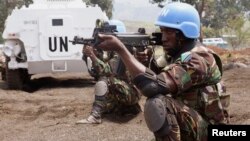GOMA —
Congo's army said it clashed Monday with eastern rebels, ending a brief lull in days of fighting that has killed and wounded dozens.
The violence, the most serious in months, is the first major test for a newly-deployed U.N. Intervention Brigade, which has an unprecedented mandate to launch military operations against rebels at the heart of nearly two decades of conflict.
It has fought alongside Congo's army several times since the latest fighting erupted on Wednesday, but said it did not take part in Monday's clashes.
The M23 rebels said they were targeted by air strikes and came under heavy weapons fire on Monday afternoon.
“As usual, we expect that ground troops will come in the wake of these bombings,” M23 said in a statement. Congo's army said rebels had attacked first and it was retaliating.
Congolese army spokesman Colonel Olivier Hamuli said clashes were taking place at Kibati, about 11 kilometers north of Goma, a city of one million people on the Rwandan border.
The rebels briefly seized Goma in November before withdrawing and committing to Ugandan-hosted peace talks. Negotiations have faltered and the renewed fighting has exacerbated tensions between Rwanda and Congo.
Several shells fell in Rwanda during fresh clashes around Goma last week, prompting Kigali to accuse Kinshasa of bombing it. Kinshasa denied the charge and accused Rwandan troops of backing the rebels.
The cross-border accusations underscore the rebellion's roots in a complex web of local politics and regional conflicts over ethnicity, land and minerals. Rwandan troops fought in two Congo wars but Kigali says it is not supporting the M23.
'Very chaotic'
A doctor at a military hospital near Goma said he was treating those injured in “ferocious” fighting on Saturday.
“It is very chaotic and difficult to have precise numbers, but we have had around 15 deaths so far. There have also been 150 injuries,” said the doctor, asking not to be named.
The doctor and a U.N. official said the rebels, whose positions were struck Saturday by U.N. attack helicopters, had lost many men in the fighting.
A rebel spokesman denied those reports. “How can we continue to protect our territory while suffering the kinds of losses they are saying? It is nonsense,” said spokesman Colonel Vianney Kazarama.
The U.N. said three of its soldiers - two Tanzanians and a South African - were injured on Saturday when a shell landed near their position just north of Goma.
The violence, the most serious in months, is the first major test for a newly-deployed U.N. Intervention Brigade, which has an unprecedented mandate to launch military operations against rebels at the heart of nearly two decades of conflict.
It has fought alongside Congo's army several times since the latest fighting erupted on Wednesday, but said it did not take part in Monday's clashes.
The M23 rebels said they were targeted by air strikes and came under heavy weapons fire on Monday afternoon.
“As usual, we expect that ground troops will come in the wake of these bombings,” M23 said in a statement. Congo's army said rebels had attacked first and it was retaliating.
Congolese army spokesman Colonel Olivier Hamuli said clashes were taking place at Kibati, about 11 kilometers north of Goma, a city of one million people on the Rwandan border.
The rebels briefly seized Goma in November before withdrawing and committing to Ugandan-hosted peace talks. Negotiations have faltered and the renewed fighting has exacerbated tensions between Rwanda and Congo.
Several shells fell in Rwanda during fresh clashes around Goma last week, prompting Kigali to accuse Kinshasa of bombing it. Kinshasa denied the charge and accused Rwandan troops of backing the rebels.
The cross-border accusations underscore the rebellion's roots in a complex web of local politics and regional conflicts over ethnicity, land and minerals. Rwandan troops fought in two Congo wars but Kigali says it is not supporting the M23.
'Very chaotic'
A doctor at a military hospital near Goma said he was treating those injured in “ferocious” fighting on Saturday.
“It is very chaotic and difficult to have precise numbers, but we have had around 15 deaths so far. There have also been 150 injuries,” said the doctor, asking not to be named.
The doctor and a U.N. official said the rebels, whose positions were struck Saturday by U.N. attack helicopters, had lost many men in the fighting.
A rebel spokesman denied those reports. “How can we continue to protect our territory while suffering the kinds of losses they are saying? It is nonsense,” said spokesman Colonel Vianney Kazarama.
The U.N. said three of its soldiers - two Tanzanians and a South African - were injured on Saturday when a shell landed near their position just north of Goma.





